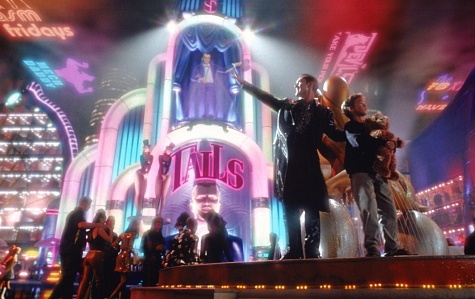Steven Spielberg is often charged with being a softhearted, fuzzyheaded sentimentalist. Last summer, AI: Artificial Intelligence was exhibit A for his detractors. For one thing, the movie's tag line, "His love is real, but he is not," was enough to make some, like the skeptical Lee, skeptically denounce the film sight unseen as a lot of soggy hogwash. But the statement is the lynchpin of a movie that ponders the essentials of sentient existence from an original point of view. While there have been many movies featuring artificial humans, and while the nature of those machines has run the gamut from utter villainy (as in Terminator) to the heroic (as in Terminator 2), none that I'm aware of has taken the narrative approach Spielberg did here. AI is a origin myth, or better yet, a fairy tale for robots
In AI, Professor Allen Hobby proposes the creation of a robot boy with the capacity to imprint upon and unconditionally love his human "parents." But as his name indicates, Hobby has more aptitude than ethics. Within moments of his introduction, Hobby stabs a female robot, or "mecha," with a pin. Then he nonchalantly orders her to undress (stopping her after she demonstrates her willingness to obey him), then presses a series of buttons on her head which causes the flesh like surface of her face to slide away and reveal the mechanism underneath.
It's hard to imagine a more personal series of affronts; but then, she is not a person. As a machine, she has no rights a human is obliged to recognize. That scene ends with her serenely ignoring her surroundings whilst applying make-up. The next scene begins with a human, Monica, serenely ignoring her surroundings whilst applying make-up. The gesture is a small trope of the way humans are programmed to engage in artifice. The overlap between humans, or "orgas," and their mecha inventions is a matter of queasiness and hostility in AI. Limited resources have forced the governments of even the most prosperous countries to put strict limits on childbirth. Mechas were originally made to fill labor needs, but as they became more sophisticated, they began to encroach on qualities that had been thought specifically human. "They made us too smart, too quick, and too many," explains Gigolo Joe, a savvy mecha sex provider recently framed for murder by a jealous human. Disused and unlicensed mechas are rounded up and carted away to Flesh Fairs, perverse celebrations of human privilege where displaced and angry orgas brutally destroy their rivals. The spectacles are geared toward the lower classes of orga society, those with routine jobs and a diminishing sense of purpose. The creation of David, a loveable and loving robot child, is the ultimate insult to human uniqueness, and the Flesh Fair impresario is quite right to identify him as such. That the crowd turns on him and votes to preserve David only proves his point. Later in the film, when David's sense of individuality is shattered, he strikes out just like the denizens of the Flesh Fair.

A
Brave New World that has Such People in It (Jude
Law & Haley Joel Osment in
AI: Artificial Intelligence )
The David line of mechas was first introduced into the home of Henry and Monica. Their son Martin lies dormant in a glass bubble, victim of an as yet incurable virus. He is surrounded by paintings of Tweedle Dee and Tweedle Dum, the Emperor in his new clothes, and other storybook figures. Monica plays Tchaikovsky's "Sleeping Beauty Waltz" for him, and reads him a version Robin Hood's legend, inculcating him in western myth. In fact, the passage she reads mentions the christening of a child named "Martin," as if to emphasize her child's connection to the canon. But for her, the process has become routine. Hardened by bitterness and sorrow, she has lost the capacity to appreciate the power of stories she tells and evokes. Martin, however, awakens from his slumber fluent in the language of fairy tales. He immediately identifies David as a threat to the social order, an interloper like Cinderella's stepsisters, a puppet like Pinocchio. In fact, Martin insists his mother read the story of Pinocchio aloud in order to send David a message--I am a real boy worthy and deserving of love, you are not and never ever will be.
David receives the message, but cannot comprehend its mythic structure. Orga Martin knows Pinocchio is a parable, an instructive story that is as useful as he needs it to be. Mecha David takes it as scripture, an instructive story that is as true as he needs it to be. And David needs it to be entirely true. (Monica does belatedly realize how she failed in educating David. "I'm sorry," she says as she abandons him in a primeval wood, "I'm sorry I didn't tell you about the world.") David's only function is to love and be loved by his mother, Monica, and he is convinced she will only love him if he becomes an orga boy like Martin, or Pinocchio. So he has faith, and he prays to the image of the Blue Fairy (who bears a marked resemblance to the Madonna) to make him real.
The prayer lasts two thousand years, or about the length of time between the making of AI and the birth of the man-God Jesus. The dates are not accidental, AI is suffused with the most potent myth of the western world, that of Judaeo-Christianity. When the morality of introducing a thinking, feeling child doll into a world that already despises less sophisticated models is questioned, Professor Hobby defends his decision by noting God created Adam explicitly to love Him. Hobby the creator proves to be careless narcissist and profiteer, at first reproducing then mass producing his dead son. He allows David to suffer Job-like trials to test the quality of his (Hobby's) workmanship.
Other mechas are framed within a Judaeo-Christian context as well. An older model is crucified at the flesh fair, for instance, to satisfy human rage. The pragmatic Gigolo Joe is converted by David's faith. After he witnesses the David's suicide plunge (the reflection of the boy's body coursing down Joe's face like a teardrop), Joe drives a submergible helicopter in after him, a baptism of sorts. When David tells him he has seen the Blue Fairy, Joe believes him, and believes what the boy says she can do. "When you become a real boy," he says, "remember me to the ladies when you grow up." Immediately afterwards, as he is levitated upwards toward a police helicopter, Joe tells David, "I am. I was." With the first part, Joe deliberately recalls the means by which the God of Moses identifies himself, as in Exodus 3:14, "I AM THAT I AM, thus shalt thou say unto the children of Israel, I AM hath sent me unto you." This is not to say Joe imagines himself as God or a god. On the contrary, "I was" acknowledges mortality. Rather, he professes his singular existence in a way that is sublime if not divine, and a leap in Joe's philosophical development.

"Cirrus Socrates Particle Decibel Hurricane Dolphin Tulip Monica David MonicaÓ (Haley Joel Osment & Frances OÕConnor in AI: Artificial Intelligence)
After two millennia of prayer, and well into another ice age, David is discovered by robot anthropologists who are curious about their origins and creators. The future robots are exotic creatures, thin and delicate, recalling the aliens from Close Encounters of the Third Kind, the logo of the company that build David, and David himself when he is first introduced in the movie, back lit and out of focus. They are self-directed in motive and aesthetic. To them, David is an ancient ancestor, and as interesting as a living, speaking australopithecine would be to Mary Leaky. A mecha Specialist explains they cannot make him real, but that they can bring Monica back for a single day. At the end of that day, however, she will die. David, with selfish, childish gravity tells the Specialist to give him his mother for that day.
And thus begins the strangest chapter in AI, an oedipal fantasy in which all but mother and child are excluded. David is the dominant partner, the one who knows the score and calls the shots. The "resurrected" Monica is vague and uncertain. She doesn't seem even to remember her husband or son--David has her all to himself. His possessiveness borders on the erotic; their day begins and ends in her marriage bed. Together they declare that this is David's birthday, and make a cake which he cannot eat, but with candles he can blow out. "Make a wish," she tells him. "It came true already," he replies.
And all day, David basks in the undivided attention she was created to provide. He began as her toy; she ends up as his. And when the day ends, they close their eyes--for the first and only time in David's case--and the voice of the Specialist notes that Monica sleeps a sleep from which she could never be roused, and that David "went to that place where dreams are born."
It's a strange sort of fairy tale that begins with the destruction of millions of humans of humans (due to global warming), and ends with the extinction of all of them--including their robot substitutes--in a global freeze. But the humans in this story play the parts that the gods did in human myths. Some are gracious and kind, others arbitrary and cruel, but all have a supernatural essence that cannot be reproduced in mecha form. When Gigolo Joe seduces a human client, he tells her, "you are a goddess." Later, the Specialist remarks upon the envy he felt of human beings and "that thing they call 'spirit.'" He continues, "Certainly human beings must be the key to the meaning of existence." The robot descendants have made a cult of humanity. David is a heroic figure to them, having aspects of mecha and orga, just as Hercules, Gilgamesh, and Jesus were part god and part man. The movie itself is a hybrid of two very different filmmaking sensibilities, grossly (though commonly) over generalized as the cold, calculating Stanley Kubrick and the warm, fuzzy Steven Spielberg. So maybe it's not such a surprise that AI had difficulty finding a audience and ended up being one of Spielberg's rare box office also rans. That was the price Spielberg paid for demonstrating the artistic integrity so many doubt he has, and for the ingenuity he is almost never given credit for. AI: Artificial Intelligence, though the most remarkable film of 2001, may prove to be a movie for the future.
Cast
Away
The
House of Mirth
Mulholland
Dr.
Ghost
World
Angel
Eyes
Introduction
Back
to Cobra Movies